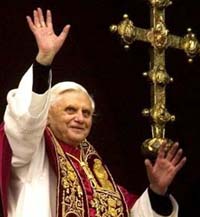Muslim world demands personal apologies from the Pope
The world is standing on the verge of another outburst of religious conflicts. A group of Palestinian nationals showered two Christian churches with hand-made firebombs in the town of Nablus, the West Bank of Jordan. Hundreds of people took to the streets to participate in religious demonstrations in Pakistan, India, Turkey, Iran and in the Gaza Strip. To crown it all, unidentified attackers shot an Italian Catholic nun and her bodyguard in Somalia’s capital Mogadishu. The murder took place soon after Islamic preachers called upon the Muslim believers to catch and kill everyone who dares to insult Prophet Muhammad.

European journalists or cartoon makers have nothing to do with the current conflicts. The Muslim world has been infuriated with the head of the Roman Catholic Church, who quoted Byzantine emperor Manuel II during his lecture about Jihad and Islam. "Show me just what Muhammad brought that was new and there you will find things only evil and inhuman, such as his command to spread by the sword the faith he preached," Pope Benedict XVI said during his lecture at a German university.
The majority of Muslims all over the world believed that the pope insulted Islam and particularly Prophet Muhammad with those remarks. Spiritual leaders of Muslims in Iraq and Lebanon drew a parallel between the pope’s speech and the notorious cartoon scandal.
Russia treated the situation with all due respect and earnestness. President Vladimir Putin urged religious leaders to preserve restraint and responsibility. “I am certain that the leaders of the basic confessions will have enough forces and wisdom to avoid extreme situations in the relationships between the confessions,” said he. The council of Russian muftis estimated the pope’s remarks as “an unfortunate example that did not fit modern reality.” The council of muftis called upon the head of the Catholic Church to make the right decision and bring his apologies.
Benedict XVI delivered his yesterday’s speech on the balcony of his summer residence outside Rome under unprecedented security measures. It was pouring rain, but the pilgrims were not allowed to bring eve umbrellas. Iraqi guerrillas from The Army of Mujahideens placed a declaration on their website shortly before the speech. The militants particularly vowed to destroy the cross in the heart of Rome. In the beginning of the mass the pope expressed his regrets over the reaction of the Muslim world regarding his lecture in Germany. Benedict XVI said that he was “deeply sorry” about the angry reactions sparked by his speech about Islam and holy war. “These words were in fact a quotation from a Medieval text which do not in any way express my personal thought,” Benedict told pilgrims.
An official statement issued by The Vatican said that the pope was sorry about several parts of his speech to have offended Muslim believers. Many Muslims, however, expected the pontiff to bring his personal apologies for the anti-Islamic remarks and thus remained unsatisfied.
Indeed, Benedict XVI did not intend to deliver a religious message to the people attending his lecture in Bavaria, Germany, nor did he want to insult Muslims. The pope delivered his lecture at the university where he used to chair the department of dogmatics of the theological faculty. One of the subjects of his lecture touched upon the issue of religious violence from a historical perspective. Benedict quoted a fragment of a philosophical dispute which supposedly took place in 1391 near Ankara (Turkey’s capital) between Byzantine emperor Manuel Paleologos II and a Persian scientist. The two argued about Jihad. Paleologos eventually agreed to conduct a dialogue with the Muslim scientist in spite of the battles for the capital of the Byzantine Empire (what we know call the city of Istanbul). The emperor, however, said that Prophet Muhammad’s idea of the holy war had brought only “evil and inhuman things” in the world.
For Germany, the native country of the pontiff, it is a highly inappropriate moment to find itself in the middle of a religious scandal. The German government is currently busy sending the first group (1500 servicemen) of its peacemakers to Lebanon. German Chancellor Angela Merkel attempted to ease the situation. “Whomever criticizes the pope has misunderstood the message of his speech,” said she. “It is an invitation to dialogue between religions and the pope has explicitly urged this dialogue, which I also endorse and see as urgently necessary,” Merkel said.
Benedict XVI, a professor of theology, ascended the throne of the Catholic Church in April of 2005. The pope is considered to be a representative of a conservative wing of the Catholic clergy. In addition, he is known as a master of scholasticism. In his statements the pope brings opposites together and then shows that they do not exclude, but supplement each other and become two inseparable parts of one.
Vremya Novostei
Translated by Dmitry Sudakov
Pravda.ru
Subscribe to Pravda.Ru Telegram channel, Facebook, RSS!


